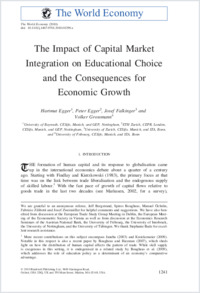The Impact of Capital Market Integration on Educational Choice and the Consequences for Economic Growth
BP2-STS
- Egger, Hartmut ORCID University of Bayreuth, CESifo, GEP
- Egger, Peter ETH Zurich, CEPR, CESifo, GEP
- Falkinger, Josef University of Zurich, CESifo, IZA
- Grossmann, Volker ORCID University of Fribourg, CESifo, IZA
- 2010
Published in:
- The World Economy. - Wiley. - 2010, vol. 33, no. 10, p. 1241-1268
English
This paper examines the impact of capital market integration on higher education and the link to economic growth. The analysis takes into account that participation in higher education is non-compulsory and depends on individual choice. Due to capital–skill complementarity, integration increases (reduces) the incentives to participate in higher education in capital-importing (-exporting) economies, all other things equal. From a national policy point of view, public education expenditure should increase after integration of similar economies in order to attract mobile capital. Using foreign direct investment as a measure of capital flows, we present empirical evidence which largely confirms our main hypothesis: an increase in net capital inflows in response to capital market integration raises participation in higher education. In addition, we show that the adjustment in educational attainment is an empirically relevant channel through which capital inflows foster economic growth.
- Faculty
- Faculté des sciences économiques et sociales et du management
- Department
- Département d'économie politique
- Language
-
- English
- Classification
- Economics
- License
-
Rights reserved
- Open access status
- green
- Identifiers
-
- DOI 10.1111/j.1467-9701.2010.01290.x
- ISSN 0378-5920
- Persistent URL
- https://folia.unifr.ch/unifr/documents/323701
Statistics
Document views: 78
File downloads:
- worldeconomy-2010-egger-theimpactofcapitalmarketintegrationoneducationalchoiceandtheconsequencesfor: 122
